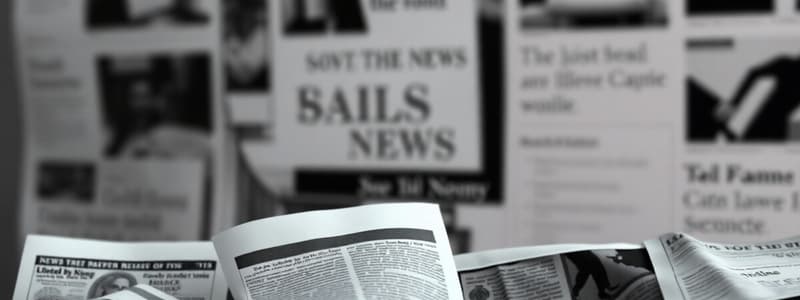Podcast
Questions and Answers
Which scenario best exemplifies the importance of understanding nuance when discussing complex issues?
Which scenario best exemplifies the importance of understanding nuance when discussing complex issues?
- A politician who only presents statistical data supporting their policy without acknowledging limitations.
- A public debate where participants acknowledge different perspectives and limitations of arguments. (correct)
- A social media post that shares a provocative headline without providing the full context of the story.
- A journalist who simplifies a scientific study, omitting details about sample size and potential biases.
A study concludes that drinking coffee significantly improves cognitive function. However, the study was funded by a coffee manufacturer and only tested participants aged 20-30. What is the most critical flaw in this study?
A study concludes that drinking coffee significantly improves cognitive function. However, the study was funded by a coffee manufacturer and only tested participants aged 20-30. What is the most critical flaw in this study?
- The study's findings cannot be generalized to the broader population due to the limited age range and funding source. (correct)
- The study used cognitive function as the primary outcome measure.
- The study lacks a control group for comparison.
- The study did not measure other variables like sleep quality or diet.
What makes the 'global commons' particularly vulnerable to exploitation?
What makes the 'global commons' particularly vulnerable to exploitation?
- These resources are maintained by individual countries.
- They are resources shared by all, where individual self-interest can lead to overuse and degradation. (correct)
- The resources are privately owned, leading to competitive extraction.
- International laws strictly regulate their use, preventing any exploitation.
Which statement best describes the key difference between a fact and an opinion?
Which statement best describes the key difference between a fact and an opinion?
How does the evolution of news sources, from traditional newspapers to social media, potentially affect the public's understanding of factual events?
How does the evolution of news sources, from traditional newspapers to social media, potentially affect the public's understanding of factual events?
Flashcards
What is an issue?
What is an issue?
A matter about which there is a disagreement; a problem or topic for debate or discussion.
Understanding nuance
Understanding nuance
Subtle differences in perspective or meaning; understanding that there are shades of grey, not just black and white.
Thinking critically
Thinking critically
Analyzing information objectively; scrutinizing sources and recognizing assumptions.
Global commons & Single story
Global commons & Single story
Signup and view all the flashcards
Fact vs. Opinion
Fact vs. Opinion
Signup and view all the flashcards
Study Notes
- Issues are subjects that people have different views about
- Issues are something the public cares about
- Nuance involves understanding subtle differences in opinions and avoiding oversimplification
- Critical thinking involves analysis and evaluation of information to form a judgment
- Electric vehicles highlight critical thinking by considering environmental benefits vs. manufacturing impact
- The flawed drinking study shows critical thinking by examining the methodology and conclusion
- Global commons refer to resources shared by all, like the atmosphere or oceans
- Dangers of a single story highlight the importance of diverse perspectives to avoid stereotypes
- A fact is a statement that can be proven true or false with evidence
- An opinion is a statement of belief or feeling, and does not need to be proven
- Bias in the news occurs when reporting favors one perspective, impacting objectivity
- Common news sources include newspapers, television, radio and the internet
- News has evolved from print to digital, affecting speed, reach, and accessibility
Studying That Suits You
Use AI to generate personalized quizzes and flashcards to suit your learning preferences.




